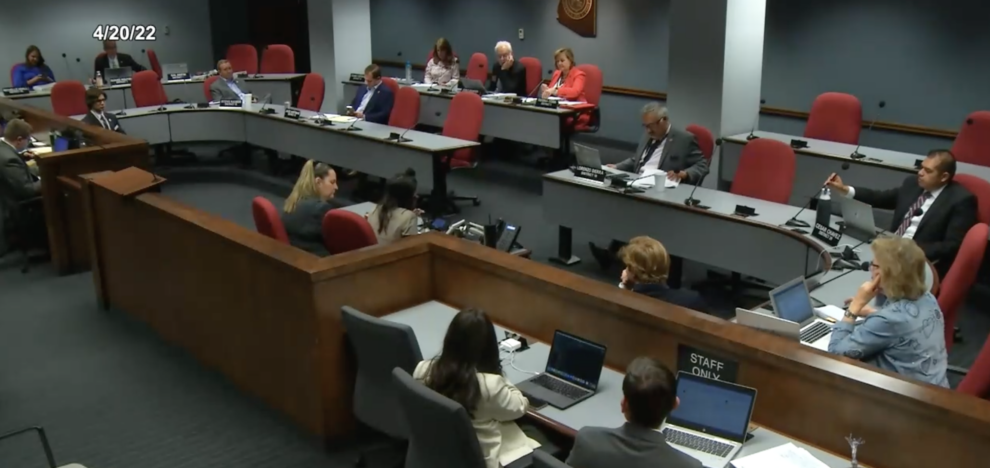Updated April 20, 2022: All 12 skinny budget bills failed in the House Appropriations Committee today after Republicans Rep. Jake Hoffman and Rep. Michelle Udall joined Democratic committee members to vote against the measures with 6 aye votes and 7 nay votes. The House and Senate are now adjourned until Monday, April 25.
Cobb: “That’s ego, and I felt that’s what kept us from moving this forward in this fashion.”Cobb says if we’re here on June 29 or 30 and we have to vote on the same budget again, we will.
And that’s it. The committee has adjourned, all 12 budget bills failed.
— Nathan Brown (@NateBrownNews) April 20, 2022
While explaining their votes against the skinny budget bills, Rep. Hoffman said government already spends too much, while Rep. Udall said the budget bills do not address several key issues.
Tomorrow’s House session is off seeing as there’s no budget to vote on. #AZLeg pic.twitter.com/8R9HQ3GUnr
— Nathan Brown (@NateBrownNews) April 20, 2022
Arizona Capitol Television: House Appropriations Committee – 4/20/2022
Lawmakers were considering what is called a skinny budget.
 Dr. Chuck Essigs
Dr. Chuck Essigs
“This skinny state budget would have a continuation of this year’s budget for fiscal year 2022 with an adjustment for inflation and growth,” said Dr. Chuck Essigs, director of governmental relations for Arizona Association of School Business Officials.
“The legislative concept is if they passed a skinny budget – a big if – they could continue the legislative session to pass more bills and think about what to do with the $5 billion of additional state dollars that are still available to fund additional state dollars that are still available to fund additional state programs or to cut taxes,” Dr. Essigs said.
House Bill 2850 is the budget bill funding K-12 public education as part of this skinny budget, includes the 2% inflation increase in funding required by state law, which has no relation to the actual inflation Arizonans are experiencing now, Dr. Essigs said.
It also includes the growth funding schools receive that reflects increases and decreases in student enrollment, Dr. Essigs said.
“No one has talked to me about a skinny budget,” AZ Gov. @DougDucey tells @broomheadKTAR this morning. Asked to define a “skinny budget,” Ducey says it means leaders are not doing their jobs. 👀
Background: https://t.co/QKFs8A2AP1 via @azcentral
— Stacey Barchenger (@sbarchenger) April 20, 2022
Click on the budget bill numbers below to check on their progress through the Legislature and then the on documents tab to read the contents of each bill:
| HB2841 | general appropriations act; 2022-2023 |
| HB2842 | amusements; 2022-2023 |
| HB2843 | state budget implementation; 2022-2023 |
| HB2844 | capital outlay; appropriations; 2022-2023 |
| HB2845 | 2022-2023 budget; courts |
| HB2846 | environment; 2022-2023 |
| HB2847 | 2022-2023 budget; health |
| HB2848 | higher education; 2022-2023 |
| HB2849 | human services; 2022-2023 |
| HB2850 | 2022-2023 budget; K-12 education |
| HB2851 | local government; 2022-2023 |
| HB2852 | management of state buildings; 2022-2023 |
House Bill 2850, the K-12 public education bill, would increase base level funding to $4,478.46 per pupil for fiscal year 2023 and increase charter school additional assistance to $1,935.86 per pupil for students in preschool programs for children with disabilities, kindergarten programs and first- through eighth-grades and to $2,256.21 per pupil for students in ninth- through twelfth-grades.
House Bill 2850 also includes a legislative intent clause relating to classroom spending that states, “The governor and the legislature intend that school districts increase the total percentage of classroom spending over the previous year’s percentages in the combined categories of instruction, student support and instructional support as prescribed by the auditor general.”
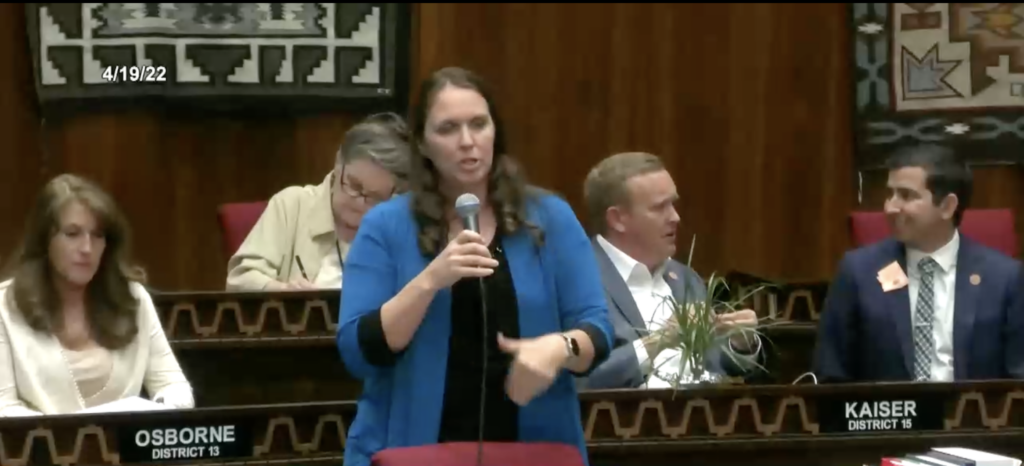
House Education Chair Michelle Udall discusses a bill on the House Floor on April 19, 2022. Photo courtesy Arizona Capitol Television
It would also increase the amount of state support for student transportation per route mile from $2.77 to $2.83 for 0.5 or less approved daily route mileage per eligible student transported; from $2.27 to $2.32 for more than 0.5 through 1.0 approved daily route mileage per eligible student transported; and from $2.77 to $2.83 for more than 1.0 approved daily route mileage per eligible student transported.
In addition, House Bill 2850 would establish the qualifying tax rate for tax year 2022 at $1.7133 for a high school district or a common school district within a high school district that does not offer instruction in high school subjects; $3.4266 for a unified school district, a common school district not within a high school district or a common school district within a high school district that offers instruction in high school subjects.
The K-12 public education budget bill would also adjust the state equalization assistance property tax rate in tax year 2022 to $0.4128.
House Bill 2850 also includes provisions for the Results-Based Funding Fund for fiscal year 2023 that would directs the Arizona Department of Education to distribute Results-Based Funding Fund monies to each school operated by a school district or charter holder at $225 per student count if the school had fewer than 60% of students eligible for free or reduced-price lunches, or an equivalent measure, when the spring 2021 statewide assessment was administered, and performed in the top 13% of all schools on the spring 2021 statewide assessment.
Schools could receive $400 per student count if the school had at least 60% of students eligible for free or reduced-price lunches, or an equivalent measure, at the time the spring 2021 statewide assessment was administered, and performed in the top 13% of schools that had at least 60% of students eligible for FRPL, or an equivalent measure, on the spring 2021 statewide assessment.
The bill also directs the Arizona Department of Education to distribute Results-Based Funding Fund monies of $225 per student count if the school had at least 60% of students eligible for FRPL, or an equivalent measure, at the time the spring 2021 statewide assessment was administered, and the school performed in the top 27% but not top 13% of schools that had at least 60% of students eligible for FRPL, or an equivalent measure, on the spring 2021 statewide assessment.
Also, schools could receive $400 per student count for each alternative high school that performed in the top 27% of schools that had at least 60% of students eligible for FRPL, or an equivalent measure, on the spring 2021 statewide assessment. Session law stipulates an alternative high school is only eligible for Results-Based Fund monies if it reports the average percentage of students who obtained a passing score on the spring 2021 statewide assessment.
There is a House budget to debate today. As a member of the @AZHouseDems Appropriations Committee I will speak up for our working families. This committee may go on for several hours. Please let me know if you have any questions or comments. #LD22 pic.twitter.com/8EKl6V4zzu
— Rep. Lorenzo Sierra (@Sierra4AZ) April 20, 2022
House Appropriations Committee Chair Regina Cobb began the meeting by saying that this budget is a continuation of what we’ve had in the past so would be limiting discussion to three people for and three people against because shouldn’t be that much discussion on a skinny budget that was approved last year.
“It is three days before a 100-day session is supposed to be ending and we don’t have any path forward,” House Appropriations Chair Cobb said. “This is a pathway forward. It doesn’t mean it is the final appropriations that are ever going to be in this session, but it could be.”
“This is not saying that this is something that I feel is the only way that we could do this, but it is saying this is a path forward and this it he path I’m presenting to you today,” House Appropriations Chair Cobb said.
Arizonans need additional investments in affordable housing infrastructure as well as public education, workforce development, small businesses, family medical leave and more state dollars toward public education, which this bare bones budget does not provide, said Natalya Brown with Creosote Partners on behalf of Arizona Center for Empowerment.
“Arizona’s communities are experiencing unprecedented levels of inflation with the cost of housing up 7% above the nationwide average. More and more Arizonans are facing the threat of evictions and being displaced from their homes, yet the state budget proposal does nothing to provide solutions to our renters, homeowners and houseless communities facing housing instability at this time,” Brown said.
“We are urging you to reject this empty budget proposal and work toward using your $5 billion surplus and your positions of power to create an economy that puts people first,” Brown said.
Rep. Lorenzo Sierra asked if the budget surplus estimated at $5 billion now would continue to grow next quarter, and Chair Cobb said it’s a forecast and if there is a downturn that number could change.
Rep. Judy Schwiebert asked why the budget was using January surplus estimates of about $3 billion and not the April estimate of $5 billion, and Chair Cobb said the budget uses January numbers to be consistent with the forecasts used to develop the previous year’s budget.
“This is just a baseline in the event that we can come to an agreement,” Appropriations Vice Chair Rep. John Kavanagh said.
“People are hurting today,” Rep. Sierra said.
“I have been working on this budget since June of last year,” Chair Cobb said. “If we can do a grander package I would be thrilled to spend some of the surplus this year.”
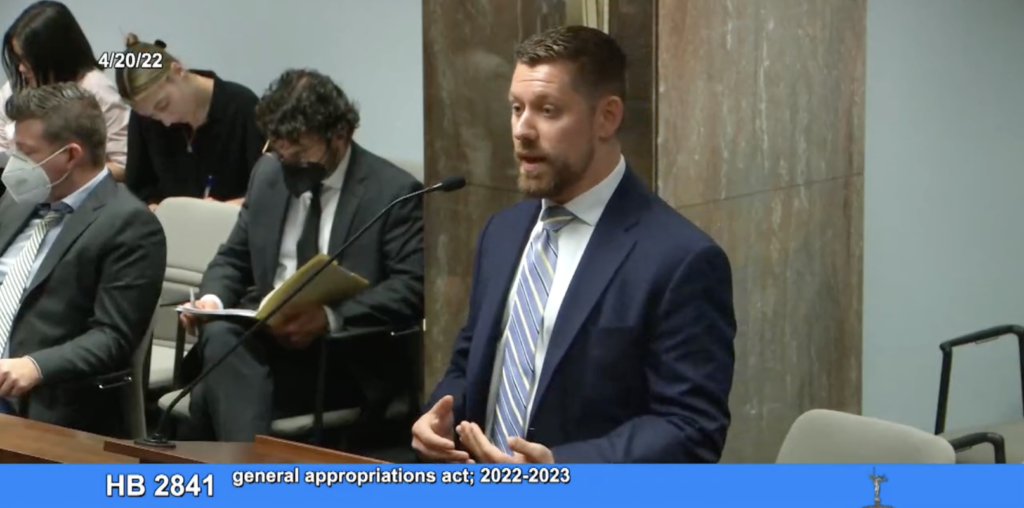
Brenden Foland with Arizona Education Association speaks against the general appropriations bill on April 20, 2022 at the House Appropriations Committee. Photo courtesy Arizona Capitol Television
“We feel that leaving $5 billion dollars on the table is a disservice to our students,” said Brenden Foland with Arizona Education Association. “We have serious issues that public education is facing after years of underfunding, after years of pandemic, our students have many issues.”
That money could make a real difference for our students with supports for mental health and learning loss, but this budget does not do that, Foland said.
“I just want to understand how the budget is contemplating funding for education, which is a huge part of our budget and we are basing this on pandemic numbers from last year,” Rep. Kelli Butler said.
“We have a divide on both sides of this aisle,” Chair Cobb said as she explained her vote for the general appropriations bill. “There’s people who did a lot of work to get things done in this session.”
“Last year, June 29th is when we passed a budget,” Chair Cobb said. “Was it the best budget? Absolutely not. It was not. We went to court, lost pages of what was in that budget because we didn’t do a good budget. This is my attempt and I’m going to continue attempting to get something done so that we can at least give assurances and possibly move the needle. We’re not moving the needle today.”
The general appropriations bill and the other 11 budget bills failed to pass the House Appropriations Committee today with votes of 6 ayes and 7 nays.
In other action, SB 1327 alternative assessment advisory committee sponsored by Sen. Nancy Barto, and SB 1654 schools; seizure management; treatment plans sponsored by Sen. Sine Kerr, were approved on third reading on the House floor, and both bills now head to Gov. Doug Ducey.
HB 2034 CTEDs; associate degrees sponsored by Rep. Michelle Udall was approved on third reading on the Senate floor, and the bill heads back to the House for concurrence on the Senate amendments that require all CTED associate degree programs to apply for regional accreditation.
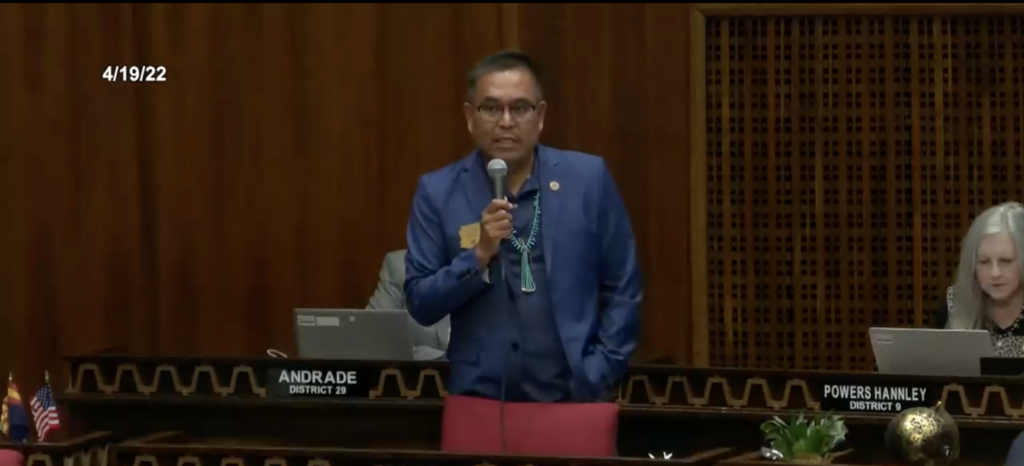
Rep. Myron Tsosie presents his amendment to a bill on the House Floor at the Arizona Capitol on April 19, 2022. Photo courtesy of Arizona Capitol Television
April 19, 2022
Budget bills were introduced in the Arizona House of Representatives on Monday, April 18, and the 12 bills are expected to be discussed and voted on later this week.
Twelve budget bills, HBs 2841-52, have just been introduced in the House. It’s a continuation of this year’s budget, per Toma. The plan is to pass these then continue work on big issues like water, ESA expansion and repealing and expanding last year’s tax cut. #AZLeg
— Nathan Brown (@NateBrownNews) April 18, 2022
 Chris Kotterman
Chris Kotterman
The bills would continue last year’s budget and include what is required to level-fund state government from year to year with only changes required by formulas and law, such as the 2% inflation increase to K-12 education funding formulas, said Chris Kotterman, director of governmental relations for Arizona School Boards Association.
Click on the budget bill numbers below to check on their progress through the Legislature and then the on documents tab to read the contents of each bill:
| HB2841 | general appropriations act; 2022-2023 |
| HB2842 | amusements; 2022-2023 |
| HB2843 | state budget implementation; 2022-2023 |
| HB2844 | capital outlay; appropriations; 2022-2023 |
| HB2845 | 2022-2023 budget; courts |
| HB2846 | environment; 2022-2023 |
| HB2847 | 2022-2023 budget; health |
| HB2848 | higher education; 2022-2023 |
| HB2849 | human services; 2022-2023 |
| HB2850 | 2022-2023 budget; K-12 education |
| HB2851 | local government; 2022-2023 |
| HB2852 | management of state buildings; 2022-2023 |
With primary elections coming up in August, Legislative leadership may be seeking to wrap up the budget earlier this session, and leave time more for candidates to campaign, but that isn’t sitting well with all lawmakers.
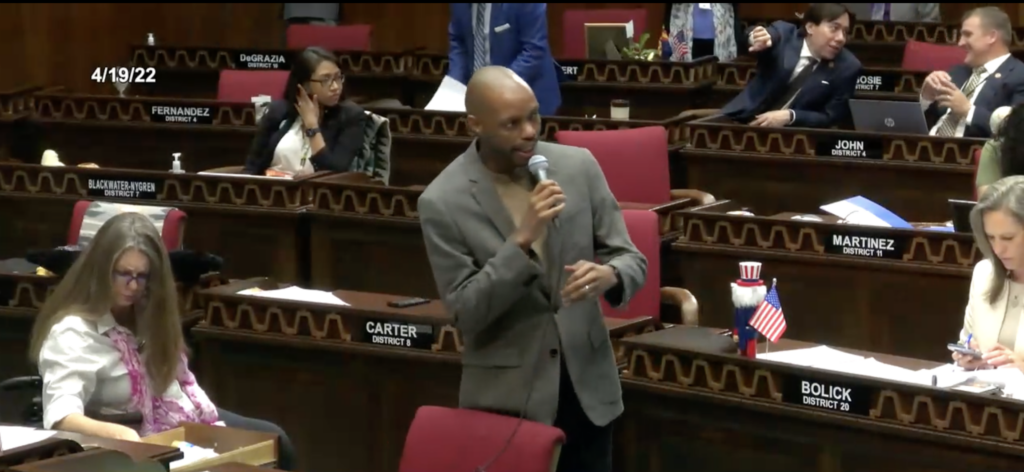
House Minority Leader Rep. Reginald Bolding discusses bills during a House floor session at the Arizona Capitol on April 19, 2022. Photo courtesy of Arizona Capitol Television
Bolding indicated the Democrats will likely oppose a “skinny budget”: “It’s going to be really hard for us to really tell families that are struggling right now the state has $5 billion and we’re choosing to (not use it).”
— Nathan Brown (@NateBrownNews) April 18, 2022
Currently, there is not enough support yet among Republican Legislators to pass the budget bills without Democratic Legislators who have expressed their concerns about the bills.
“We’ll see” as in “I don’t know, we’ll find out,” not as in “yes there will be.” Just realized that could be taken two ways.
— Nathan Brown (@NateBrownNews) April 19, 2022
Republicans hold slim majorities in both the House and Senate. A few Republican Legislators have expressed concerns about the budget bills.
House Education Chair Paul Boyer has said that unless yearly K-12 education funding is raised by $900 million to $1 billion to honor Arizona voters who approved the Invest in Ed initiative that was later struck down by the courts, he will not support a Republican plan to repeal and replace the tax cuts passed last year that would avoid a voter referendum on the issue, KJZZ FM 91.5 reports.
The tax cuts approved last year, would save Arizonans earning between $75,000 and $100,000 about $231 a year in state income taxes, while those earning between $500,000 and $1 million a year would save more than $12,000, according to the Legislature’s budget analysts, KJZZ FM 91.5 reports.
Sen. Paul Boyer is stalling the budget over education funding. Here’s why.https://t.co/APYexL3TlY
— KJZZ Phoenix (@kjzzphoenix) April 18, 2022
Education advocates say more could be done to support students and teachers than what’s in the budget bills now.
The @AZSenateGOP & @AZHouseGOP could fill the 1000s of teacher vacancies across the state or give $350,000 to each multi-millionaire in AZ. Which will they choose? https://t.co/ZzVvPuZvLo
— Joe Thomas (@AZ1Thomas) April 19, 2022
The Joint Legislative Budget Committee reported that there is $2.8 billion in one-time funding Legislators would allocate this year and about $1.29 billion in ongoing funding for Legislators’ priorities
State lawmakers are looking to wrap up the legislative session this week with an anticipated $5 billion surplus in the budget. https://t.co/KBbverkctA
— KJZZ Phoenix (@kjzzphoenix) April 19, 2022








